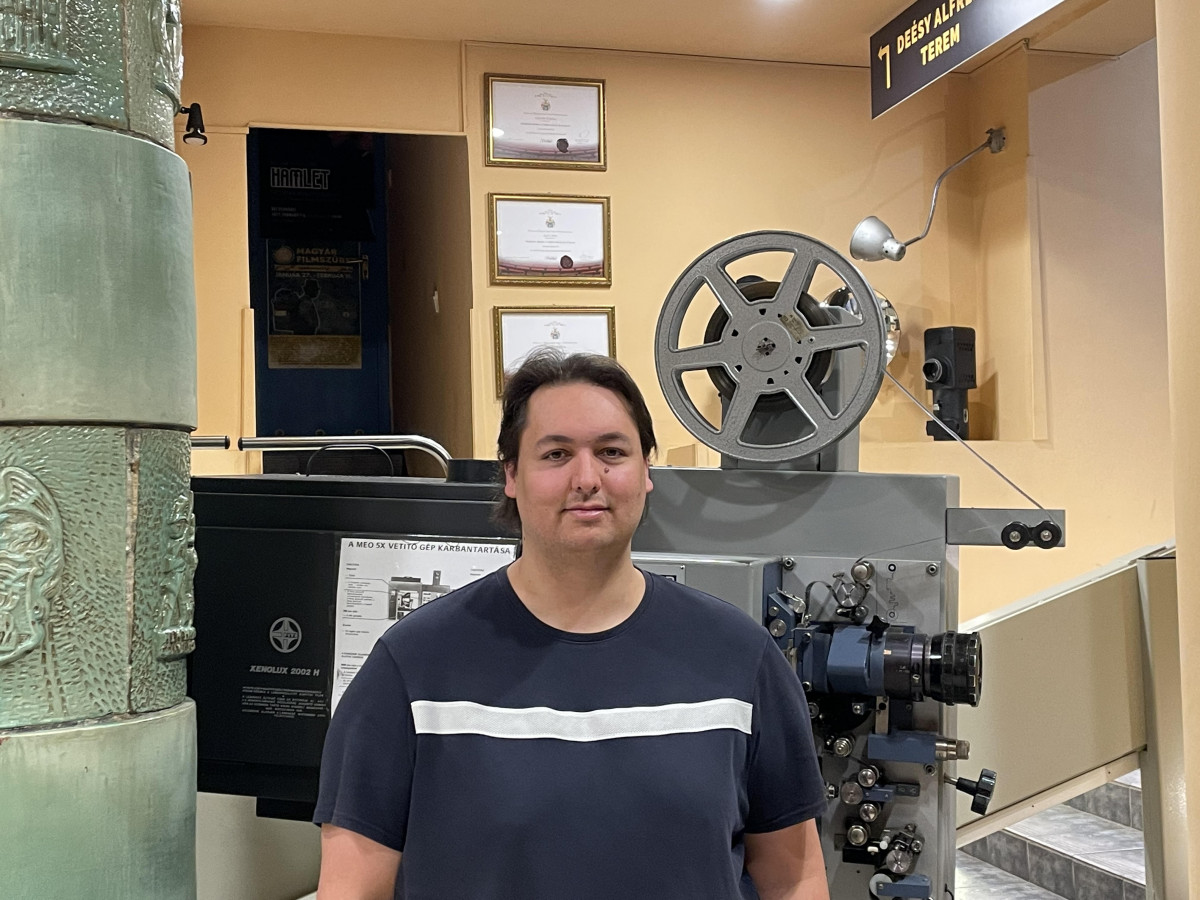We talked to Tamás Fejér, the manager of the Apolló cinema, about film love, streaming service providers that make people stupid, and why we should go to the cinema in the first place.
Has the Apolló cinema, which is now 110 years old, always looked like this?
The location has never changed, internal reconstructions are what have been continuous throughout the life of the cinema. A long time ago, there was only one large hall that could fit more than five hundred people. But during the one hundred and ten years it was always modernized to meet current expectations. In the 1990s, a major transformation took place, when it was closed for a year and a half. It was then that the current structure was created, still known as the Great Hall, the Small Hall and the Art Hall. It’s 2013, and in 2014 we renamed the halls after our Oscar-winning film director Mihály Kertész, Alfréd Deésy, who was the first director of the cinema, and Imre Soós, one of our greatest Hajdúság actors.
You are a great lover of movies and cinemas. Is that why you started working at the Apolló cinema years ago?
I wanted to be a film critic, I studied to be one, and obtained a degree in journalism. It was not in my mind that I would work here dedicatedly, only because of the combination of circumstances at the time, I was asked to manage the cinema, I was the plan B, so to speak. I accepted and have been here ever since. It’s been almost 10 years.
When a new film is shown, do you watch it with the audience or before it is screened -alone?
When I test a film, I watch it a few days before, but most of the time I sit in with the viewers. Unfortunately, the 100% enjoyment of the movie is already there, because I’m paying more attention to whether the sound is good, whether the movie doesn’t freeze, and whether everything is in order at the buffet. If a person works in a cinema, it has the effect that the film ceases to be a hobby for him, because it becomes work. But if I didn’t work here, I would go twice a week for the experience.
When a Hungarian film is shown in cinemas, how do you decide whether it will be screened or not?
When a film is made, its distributor or the filmmaker is the one who offers it to all cinemas, just like us. We receive inquiries about this, and we can decide whether we want to deal with this particular film or not. We decide what to include at the premiere or after the premiere, and it’s 100 percent my decision. Now, due to the overhead reduction, we do not operate one of the three rooms, but it is very difficult to schedule even with the three because there are so many appearances. I have several aspects to consider.
We try to keep what’s going well on the show. We are a registered art cinema, so we also play mandatory artist content. Unfortunately, there are also films that we record, but we already know that no one will watch them and they will be a flop. But we will show them because it is our cultural duty, and the few people who need them can watch them. We like to find what art film is, which aligns with our ethos, and even the viewers like it. For example, the Island of Good Hope (Jóreménység sziget) is like this.
Do the majority only come to the so-called “big movies”?
We call them Blockbusters because these are the big-budget, mainstream movies that you know have invested a lot of money in production and marketing, and there is such hype surrounding them that people flock to them. This term was coined when the film The Shark was released in America in 1975, and there was a line in front of the box office that stretched around the block of flats. Now, for example, Avatar, Marvel and DC movies are like this.
Do all art cinemas have an audience meeting? Or is this a feature of the Apolló cinema?
Those who know invite the Hungarian creators to talk. We also hold this during the year, but we have a festival specially themed for this, the Magyar Filmszüret, which was organized for the seventh time this year.
Streaming platforms almost chain people to watching movies at home. To what extent does this have a negative effect on cinema-going?
It has a very bad effect on it. During Covid, the demand for streaming has increased abominably. A 10-year deficit was worked off in one year. People got used to this situation, and many of them developed a different kind of movie-watching attitude. Many people think that if a new movie comes out, it will come to streaming in two months anyway, and they will wait there. This is not good for us. The situation is quite different with films and series prepared specifically for streaming. For the most part, they are stupid works, and eighty percent of the contents are undemanding, plastic waste. I say this because I also have a subscription with every service provider. Sometimes I look into it, but I’m already fed up with the same things being pushed down my throat, over and over again. However, it seems that there are a lot of platforms, and as these streaming providers expand, the market is fragmented. Because subscribers will not subscribe to even more places, since less and less content is available on all platforms, because their own copyrighted content is taken back by individual service providers. This will drive people back to cinemas in the long run. I’m waiting for the wind to turn.
Despite this, I also had such an uplifting experience not so long ago when we watched a Hungarian film in the Kertész room in a full house, with a diverse audience.
The social experience is an essential part of going to the cinema. You can watch any movie at home, but the atmosphere will be different if people go to the movies together, and watching movies at home cannot reproduce that. I also watch movies at home, although since I work in a cinema, I’m not so interested at home anymore. In cinemas, I can reach the screen at any time. However, what really has a place on streaming platforms are series, because this format is practically unplayable in cinemas.
And what about documentaries?
They are not for sale. Of course, there are, we also present them, but only a few people are interested in them. When you vote with your money and time to watch a movie here, it won’t be a documentary. It affects emotions in a much different way. I say that this type has no place in cinemas, but nevertheless, we present the ones that are important for people to see.
And the price of a movie ticket is not a horrible amount either.
Both the ticket and the buffet should be more expensive, but we can’t do that. Because in order to make it available to everyone, we have to keep them at a human price.
How to imagine the life of a cinema manager?
What does a clerk do? I make phone calls, exchange e-mails, negotiate, and I don’t even notice, and the whole day is gone. I supervise the work of nine people on a daily basis. Besides, I listen to all the movies, I watch them. No film is released to the audience without having seen at least two minutes of it. I don’t think they do this in all cinemas.
Are you doing it because it’s your duty or because it’s your passion?
My heart. It has to be perfect, and besides, we can’t leave. And I trust myself so much that everything will be fine. We have technical delays at the Apolló cinema, that’s a fact. But with the enthusiasm and the pursuit of perfection that we do, we can give people the choice to choose us.
Is it a job or a profession for you?
Just like the profession of a doctor, firefighter, and disaster management worker, the cinema is a job. Managing a cinema is a twenty-four-hour job. Because it doesn’t matter if it’s six o’clock in the morning or in the evening, you still have to come in. And there have also been times when I spent Christmas inside because we had to fix a broken server. You can do it for love, but cinema is not a profession.
What would you tell people why they should go to the cinema?
You can get lost in the cinema, during the two or three hours they are here because, during the movie the outside world ceases, and they become part of another world both spatially and mentally. They are not bothered by any external circumstances, there is no need to pick up the phone or answer messages, only the experience they become a part of matters. And at home, the space cannot be so dark and closed, at home there will never be such large canvases, such sound. The cinema is an adventure, after which everything will be different, at least for a few hours.
Translated from Judyt Rontó article at the Debreceni Nap.


















